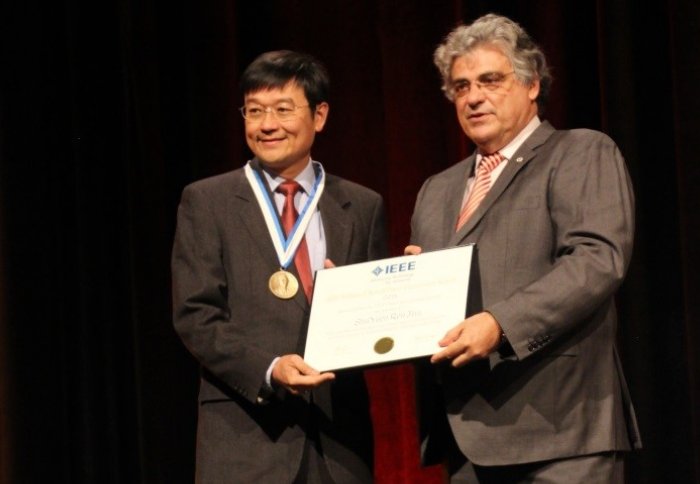EEE Professor wins Two IEEE Awards
by Kay Hancox

Professor Hui is presented with the IEEE William E Newell Power Electronics Award from Past IEEE President Professor Roberto de Marc
Professor Ron Hui was presented with the IEEE William E Newell Power Electronics Award, and the 1st prize for a paper in IEEE Trans Power Electronics
Professor Ron Hui, Chair in Power Electronics of the Control and Power group recently won two awards from the Institute of Electrical and Electronics Engineers (IEEE), the world’s largest professional association for the advancement of technology. Professor Hui was presented with the awards at the IEEE Energy Conversion Congress and Exposition (ECCE) Conference in Montreal in September.
Professor Hui was awarded the IEEE William E. Newell Power Electronics Award, which was founded in 2005 to honour researchers who have made outstanding contributions to the advancement of power electronics. Professor Hui says: “I am delighted to be the 10th recipient of this prestigious award for contributions to planar wireless charging and sustainable lighting technology. This is the first time that this prestigious IEEE award is given to a researcher affiliated with a university in the United Kingdom.” Professor Hui delivered his acceptance speech to over 1,500 conference attendees after receiving his medal and certificate
Professor Hui is well known for his highly innovative and visionary research, with strong emphasis on energy saving and environmental protection. His research is the basis for Qi, the global standard in wireless power. The Qi standard was launched in 2010 by the Wireless Power Consortium, a group of over 210 company members worldwide. This wireless charging technology will hopefully reduce huge amounts of electronic waste caused by the lack of common charging protocols in the past. Additionally, it opens the door for the design of new water-proof devices, and such technology can be extended to medical implants and wireless power retransfer for medical treatments. The standard is now being expanded from 5W to the kilo-watt range to cover more applications including kitchen electrical appliances. He is also the pioneer of sustainable lighting technology that emphasizes not only high energy efficiency, but also long product lifetime and recyclability. The photo-electro-thermal theory for Light-Emitting Diode (LED) systems that he developed have become the design and modeling tool for lighting research community and industry.
Professor Hui was also awarded the First Place Prize Paper, 2014 by the IEEE Transactions on Power Electronics for this paper on A Critical Review of Mid-Range Wireless Power Transfer Systems’ (co-authored with Dr W. Zhong and Dr C.K. Lee) which was selected out of 579 papers published in 2014.
Professor Hui says “This is the third "First Transactions Prize Paper Award" I have received from the IEEE Power Electronics Society in recent years. The other two were received in 2009 and 2010. We are delighted that the quality of our work has been recognized because it reflects that our strategy of focusing on ground-breaking research has been fruitful. In this award-winning paper, we explain that all wireless power systems can be classified under two principles, namely the Maximum Energy Efficiency Principle and the Maximum Power Transfer Principle. Then we further explain their advantages and limitations. These explanations allow all wireless power researchers to differentiate their systems and select the appropriate type to suit their applications. Within 12 months of its publication, this paper has been cited over 80 times.”
Read about the IEEE here.
Article text (excluding photos or graphics) © Imperial College London.
Photos and graphics subject to third party copyright used with permission or © Imperial College London.
Reporter
Kay Hancox
Department of Electrical and Electronic Engineering